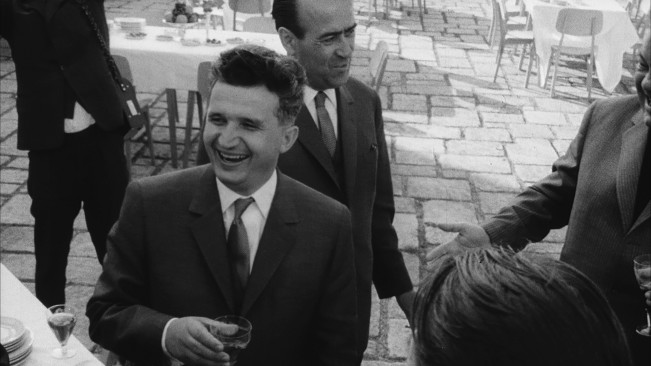

By Ray Pride Pride@moviecitynews.com
FILM: Autobiography Of Nicolae Ceauşescu
 Andrei Ujica’s Autobiography Of Nicolae Ceauşescu (Autobiografia lui Nicolae Ceauşescu, ****) is a wry, comic, hallucinatory, slowly-disintegrating exercise in found footage, sound design and cultural criticism. Its three hours is comprised entirely of propaganda film shot to glorify dough-faced dictator Nicolae Ceauşescu across the decades of his cruel rule of the underprivileged country under Soviet rule. The only footage not under Ceauşescu’s hand is the rough VHS-grade bookends from 1989 of the provisional trial of he and his reputedly even crueler wife, Elena, stunned as they are told they will die for their crimes. What’s most mesmerizing is the rise and fall of production values and as years go by, the increasing unease and even disinterest of the other figures in the government who fill the frame. They smell the slow, encroaching stink of decrepitude, death. Autobiography Of Nicolae Ceauşescu is a far spacier ride than Trey Parker and Matt Stone’s musical rendition of Kim Jong-il in Team America: World Police, and almost sad beyond relief despite being an even more expansive burlesque. (How many millions of dollars did the thousands of hours of footage cost to produce across the dictator’s decades? Yikes.) Yet Ujica’s canny sound design is as critical as his studious montage: it is a critique of an epoch and its monster, but “autobiography” as the vain, vainglorious bastard never imagining he was confecting from his cloud cover of cut-rate hagiography. #
Andrei Ujica’s Autobiography Of Nicolae Ceauşescu (Autobiografia lui Nicolae Ceauşescu, ****) is a wry, comic, hallucinatory, slowly-disintegrating exercise in found footage, sound design and cultural criticism. Its three hours is comprised entirely of propaganda film shot to glorify dough-faced dictator Nicolae Ceauşescu across the decades of his cruel rule of the underprivileged country under Soviet rule. The only footage not under Ceauşescu’s hand is the rough VHS-grade bookends from 1989 of the provisional trial of he and his reputedly even crueler wife, Elena, stunned as they are told they will die for their crimes. What’s most mesmerizing is the rise and fall of production values and as years go by, the increasing unease and even disinterest of the other figures in the government who fill the frame. They smell the slow, encroaching stink of decrepitude, death. Autobiography Of Nicolae Ceauşescu is a far spacier ride than Trey Parker and Matt Stone’s musical rendition of Kim Jong-il in Team America: World Police, and almost sad beyond relief despite being an even more expansive burlesque. (How many millions of dollars did the thousands of hours of footage cost to produce across the dictator’s decades? Yikes.) Yet Ujica’s canny sound design is as critical as his studious montage: it is a critique of an epoch and its monster, but “autobiography” as the vain, vainglorious bastard never imagining he was confecting from his cloud cover of cut-rate hagiography. #














